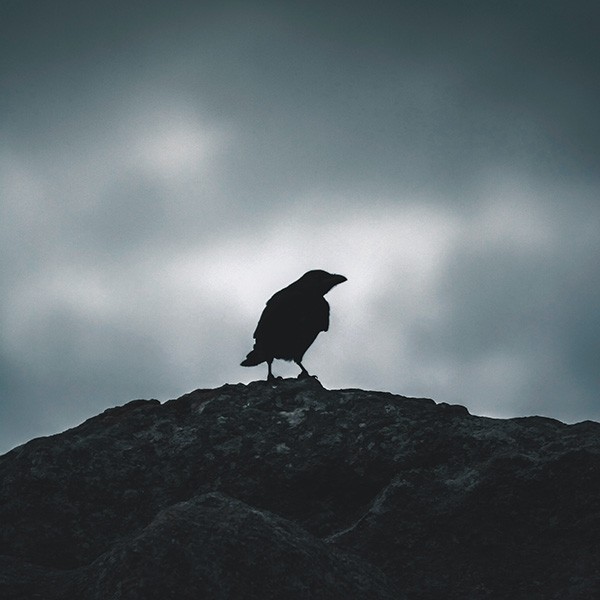Things Stay with You

I had tried all the usual methods for making friends. I rode the bus. I made non-imploring eye contact over the cubicles at work. I went to church.
Then I read an article about a woman who had befriended some crows in her neighborhood. Knowing crows liked shiny objects, she’d left screws and scraps of foil for them on her patio. The crows started following her everywhere. They flapped along behind her when she walked down the street. They kept watch from lampposts while she ate at the café. They rode on the rear-view mirrors of her car. She was never alone, not for one minute! All for a few bits of junk!
There were plenty of crows in my neighborhood, too. What would happen, I wondered, if I gave them something better than screws and foil? Nothing valuable, mind you, only objects I could part with, which would seem to the crows like treasures.
I combed through my jewelry box for earrings that had lost their mates, rings missing their stones, pendants without their chains. I selected a silver earring shaped like a treble clef and set it on the plastic table on my balcony. I went to work and stayed till after dark, then went straight to bed, suppressing my urge to check the table constantly. Your neediness drives everyone away, a former friend once told me. Give people space to come to you. I figured that was true for crows also.
My forbearance was rewarded: the next morning, the earring was gone! High in the winter sky, a crow circled. I waved, but quickly stopped: too much, too soon. I set out a locket containing the silhouette of some Victorian woman and absented myself again. In the morning the locket had vanished; a crow circled. Was this the same crow, or a different one? If the same, perhaps it was growing attached to me. If different, word might be spreading about the generous lady in apartment 2C. I hoped for the latter. One crow shouldn’t have to leave its friends for me. I wanted to be part of the crow’s group—the murder, it’s unfortunately called—like the woman in the article. I wondered what I would name my crow friends. And what might they, in their language, name me?
For seven days, the pattern persisted. I put out a piece of jewelry and waited overnight to see what happened. Each morning, the piece was gone, and a lone crow—a scout, I decided—circled. Why didn’t it come any closer? Perhaps the crows realized I was unloading broken things on them, pretending my castoffs were gifts. I knew crows were smart. I would have to offer them good pieces—heirlooms, presents from my dead father, my engagement ring, removed in a fury years ago but never returned. I was willing to sacrifice these, and much more, to make that crow trust me.
Just after midnight on Day Eight, I awoke to a repeated clacking sound. In the moonlight seeping through the blind, a shadow moved. I sat up, pulsing with hope: a crow, or several, judging from the shadow’s size, had found their way into my bedroom. The clacking was a crow greeting! They were inviting me to join the murder!
“Yes,” I whispered. “I’d be delighted.”
The clacking paused. The shadow spoke, in a voice I never could forget.
“I’ve told you a million times not to give your things away.”
The shadow was my mother’s ghost. One by one, she’d been laying the gifts I’d tried to give the crows on my dresser.
“People will take and take and leave you with nothing,” Mom said, setting down the clef earring with one last clack.
I’d never seen a ghost before, let alone one of Mom, who’d been dead for three years and never even appeared in my dreams. I was too angry to be scared, however. That circling crow had seen and wanted my jewelry, and Mom had grabbed it before the crow could get it.
“I was giving things to birds, not people,” I said evenly. “Besides, those pieces were broken. I was giving them another chance to be loved.”
“Why didn’t you love them?” Mom said.
I did, though.
Mom sat down beside me and began telling the stories—the same stories she’d always told, in the same order. They were all about the people who had hurt her, starting with her best friend in kindergarten, who’d made fun of her behind her back.
“Everyone you trust will betray you,” Mom said. Her shadow-body was surprisingly heavy, tipping me toward her side of the bed. I pulled away and wrapped my arms around my knees.
“Things stay with you through thick and thin,” Mom said. “That’s why you must keep your jewelry. Fix it if it’s broken. Do right by your things and they’ll do the same.”
She told me about her sister and her mother, their secret alliance against her.
When I was a kid and Mom told these stories—or this single, ever-lengthening one—I would make an excuse and run out into the woods behind our house. I stood still until the birds, silenced by my incursion, resumed chirping. Even in the dead of winter, I followed Mom’s instructions not to bring them anything to eat, because they’d only expect more next time. But I hoped they knew I was there with them.
Mom’s ghost told the story about my father, who hadn’t fought his illness hard enough. Then came the story about me. I’d never heard Mom tell it before. It turned out to be very short.
“You hated me,” she said.
She was wrong, but I didn’t argue. Nor did I run away. I held myself beside her, both of us silent, until morning came and the shadow dissipated.
I went out to check the table. Waiting there was pile of jewels I’d never seen before, and a crow who told me my new name.

